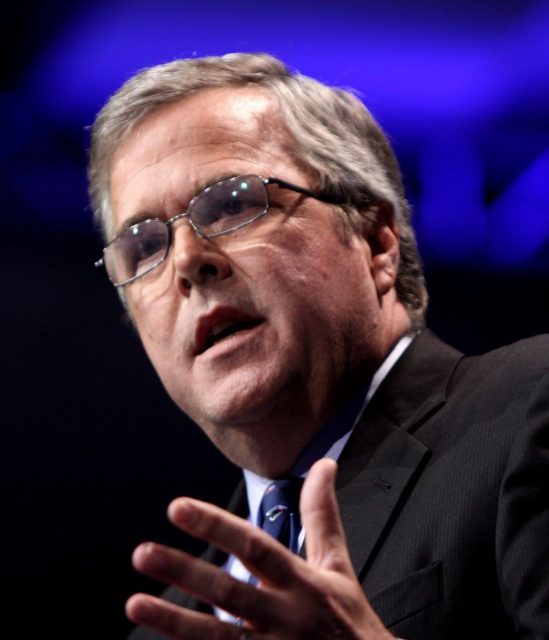
Former Governor Jeb Bush of Florida speaking at the 2013 Conservative Political Action Conference (CPAC) in National Harbor, Maryland.
NASHVILLE — Fighting to allow people to live by their religious convictions, even if those convictions are unpopular or criticized, is a battle Jeb Bush believes the next president must lead.
The former Florida governor and GOP presidential candidate pledged to defend religious liberty in front of an estimated 13,000 evangelical pastors attending a massive Southern Baptist Convention event Tuesday (Aug. 4) at Bridgestone Arena in Nashville.
“This is a foundational freedom of our country … the president should have not just the right but the duty to explain why this is a threat to not just religious freedoms but other freedoms,” Bush said, referencing the ramifications of the Supreme Court’s recent ruling on same-sex marriage.
“You take this freedom away, it’s very easy to imagine other freedoms being taken away.”
The Southern Baptist event didn’t focus on politics apart from the Tuesday afternoon session, led by Russell Moore, president of the Ethics & Religious Liberty Commission, the public policy arm for the denomination.
Moore interviewed Bush in person, discussing everything from religious freedom to Hillary Clinton and Bush’s new diet. A pre-recorded interview between Moore and Florida Sen. Marco Rubio, another GOP presidential candidate, was shown before the Bush interview and focused on largely on the same topics.
The concept of religious liberty is front and center in the national conscience after the ruling, which prevent states from banning same-sex marriage or not recognizing such marriages licensed in other states. The ruling should not be a way to force religious businesses to participate in same-sex weddings, Bush said. He argued its discrimination for a florist to refuse to sell flowers to someone because they’re gay, but that florist should be allowed to refuse to provide flowers for a same-sex wedding.
“We don’t want to create an environment that discriminates against people based on their sexual orientation, and we certainly don’t want to discriminate against people that believe that their faith drives their actions and the things that they consider to be important,” Bush said.
“That balance is what we need to find.”
Both Rubio and Bush also pledged to protect tax-exempt status for religious organizations, like churches or private universities. The question of the status arose during the Supreme Court case on gay marriage; although the majority disagreed, several justices and the U.S. solicitor general said they thought the exemption is “going to be an issue” in the future.
Bush converted to Catholicism 20 years ago, and faith has become a key facet of his campaign. Values voters tend to support Republicans, and many in the crowded GOP presidential field are trying to court the evangelical vote. With an estimated 15.8 million members in 46,000 churches, the SBC is the largest Protestant denomination in the country.
In a March interview with The New York Times, Moore praised Bush for his sincerity in a conversation they’d shared about faith.
“Some candidates feel that they have to talk about this, so they prep up to do so, and then do so in an inauthentic and pandering sort of way,” Moore told TheTimes. “He seemed very confident in where he stands personally in terms of his faith, and it was a very easy conversation for him.”
In his pre-recorded interview, Rubio promised to protect religious liberty if elected president through appointing Supreme Court justices and picking an attorney general ready to defend people’s ability to live by their religious standards. Bush echoed those promises.
Bush, Rubio and eight other Republican presidential candidates are set to take a national stage Thursday for the first GOP debate of the primary campaign. Moore asked both candidates about topics likely to appear in the debate: fighting terrorism and Planned Parenthood.
Both said they wouldn’t rule out sending American troops to fight ISIS while championing the need for more involvement from local forces and increased airstrikes, a common sentiment among the Republican candidates. Both also bashed Planned Parenthood.
“Abortion in America has become a money-making industry,” Rubio said, adding that he would opt to stop providing federal funds to Planned Parenthood if elected president.
(Dave Boucher writes for The Tennessean.)




